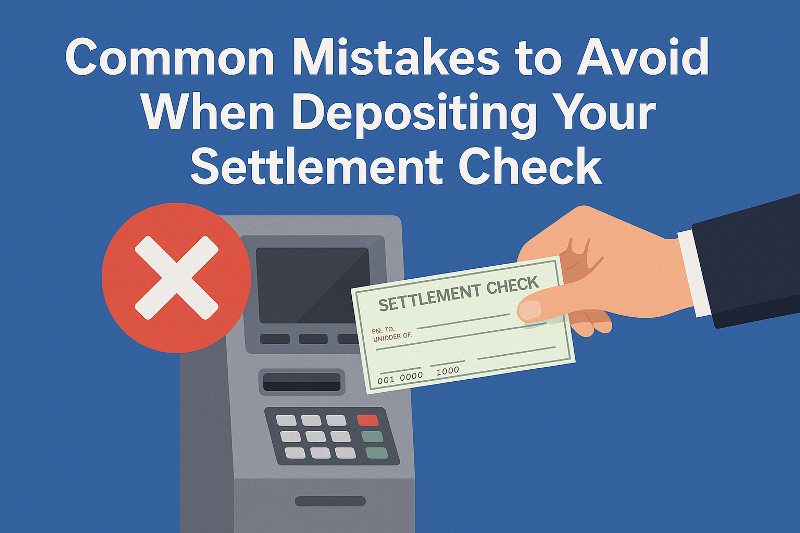10 Common Mistakes to Avoid When Depositing Your Settlement Check
So, you finally got your settlement check—congrats! Whether it’s from a personal injury case, a lawsuit, or an insurance payout, that check likely represents a long, stressful journey finally coming to an end.
But here’s the kicker: what you do next matters even more than how you got the check.
There’s more to depositing a settlement than just walking into your bank with a smile. If you’re not careful, you might lose out on thousands—or worse, end up with legal or tax issues you never saw coming.
Let’s walk through the 10 most common mistakes to avoid when depositing your settlement check, so you don’t learn the hard way.
Not Understanding the Full Settlement Terms
Hidden Clauses Can Haunt You
Ever read the fine print on a phone contract? Settlement agreements are way worse.
Before you even think of depositing the check, make sure you understand every word in that settlement. Some agreements have restrictions or payment conditions that can bite back later.
Always Ask Questions Before Signing
If there’s anything that’s unclear, talk to your attorney before you sign. Don’t be shy—you’re not being annoying; you’re protecting yourself.
Depositing Without Consulting a Financial Advisor
Why Taxes Might Be Lurking
Just because it’s a settlement doesn’t mean it’s tax-free. A financial advisor or CPA can help you avoid tax nightmares next April.
Smart Planning Equals Long-Term Gain
Think of a financial advisor like a GPS for your money. Sure, you could figure it out yourself… but why risk it?
Failing to Verify the Check’s Authenticity
Scams Do Exist—Even in Legal Wins
Believe it or not, there have been cases where fake settlement checks were issued. Always double-check with your law firm or insurance company to ensure it’s real.
When in Doubt, Contact the Issuer
Call the bank listed on the check or your attorney directly. Better safe than sorry, right?
Depositing the Entire Amount Into a Regular Checking Account
Easy Access Can Lead to Easy Spending
That much money sitting in your daily account? Temptation galore. Suddenly, your Amazon cart looks way too inviting.
Create a Temporary Holding Strategy
Set up a separate high-yield savings account or trust to keep that money safe until you finalize your plan.
Ignoring Tax Implications
Settlement Doesn’t Always Mean Tax-Free
If your settlement includes lost wages, punitive damages, or interest, guess what? That’s taxable income.
IRS Rules You Must Know
Talk to a tax professional to break down how much you might owe—and when. Planning now prevents penalties later.
Not Paying Off Debts Strategically
Random Payments Aren’t Smart Payments
It’s tempting to throw money at all your bills. But pause. Are you paying off high-interest credit cards or that 0% car loan?
Prioritize High-Interest Loans First
Start by tackling the debts draining your wallet with interest. It’s like plugging the biggest leaks before the small ones.
Making Big Purchases Immediately
Why You Should Sleep on It—Literally
That luxury SUV or spontaneous vacation sounds nice—but will it still sound smart next week?
Emotional Spending vs. Rational Thinking
You’ve been through a lot. Emotions can cloud your judgment, especially when cash suddenly lands in your lap.
Skipping Legal or Financial Advice
Why “Free Advice” Isn’t Always Good Advice
A friend or cousin might mean well, but unless they’re licensed, they’re just guessing.
How a Pro Can Save You Thousands
Hiring a professional might cost upfront, but the advice can be worth 10x in saved taxes and protected assets.
Failing to Update Your Financial Goals
Settlements Can Shift Your Life Path
Suddenly having thousands or even millions can totally reshape your future plans. Don’t keep using your old roadmap.
A Check Can’t Replace a Plan
Use this opportunity to sit down and re-evaluate your goals, retirement, home ownership, or starting a business.
Not Keeping Proper Documentation
Audits, Disputes, and Accountability
You’ll need paperwork for taxes, disputes, or future questions. It’s not just bureaucracy—it’s protection.
Keep Every Email, Receipt, and Paper Trail
Digitize your documents, create folders, and store backups. You never know when a bank or the IRS might ask for proof.
Bonus Tips for Smart Handling
Consider a Trust or Special Account
Especially for large settlements, a trust fund can offer asset protection, long-term growth, and even tax benefits.
Build an Emergency Fund
Put aside a portion for unexpected expenses. Because, well… life happens.
Conclusion
Your settlement check isn’t just a reward—it’s a responsibility.
Avoiding these common mistakes isn’t about fear. It’s about empowering yourself to make smart, secure, and strategic choices. Don’t rush. Don’t gamble. And definitely don’t underestimate the impact of expert guidance.
Take a deep breath, do your research, and let your money work for you—not against you.
FAQs
1. What should I do first after receiving my settlement check?
First, verify the check’s authenticity, then consult with a financial advisor or attorney before depositing it anywhere.
2. Can I deposit my settlement check into any account?
Technically yes, but it’s smarter to use a separate account or high-yield savings to protect and plan your funds.
3. Are all settlement checks taxable?
Not always. Some parts may be taxable (like lost wages), while others (like pain and suffering) might not be. Ask a CPA!
4. Should I hire a lawyer to help manage my settlement?
If it’s a large amount, absolutely yes. They can help you protect your assets and plan for the future.
5. What happens if I lose my settlement check?
Immediately notify your attorney or the issuing party. They may reissue it, but it could take time and verification steps.







